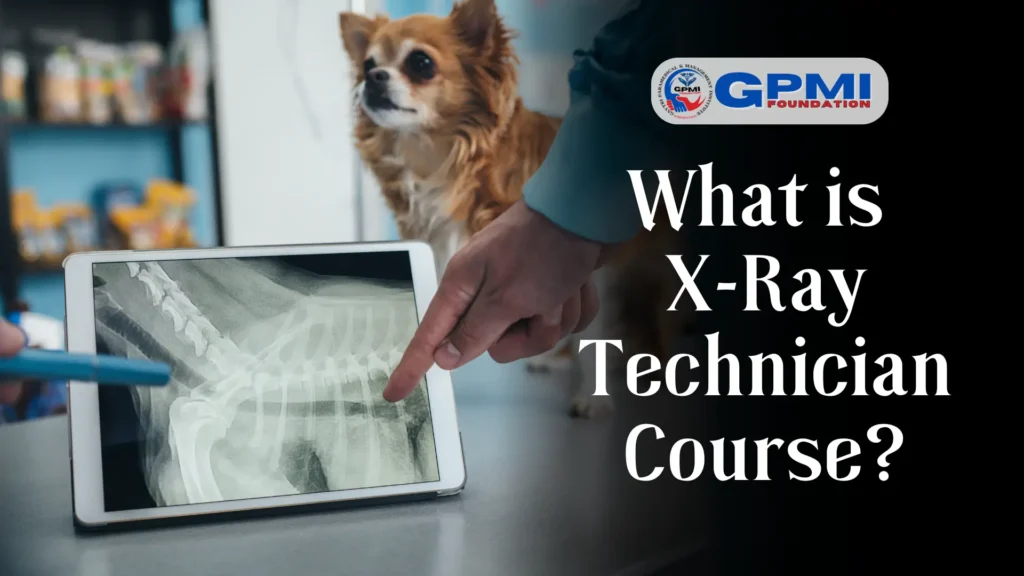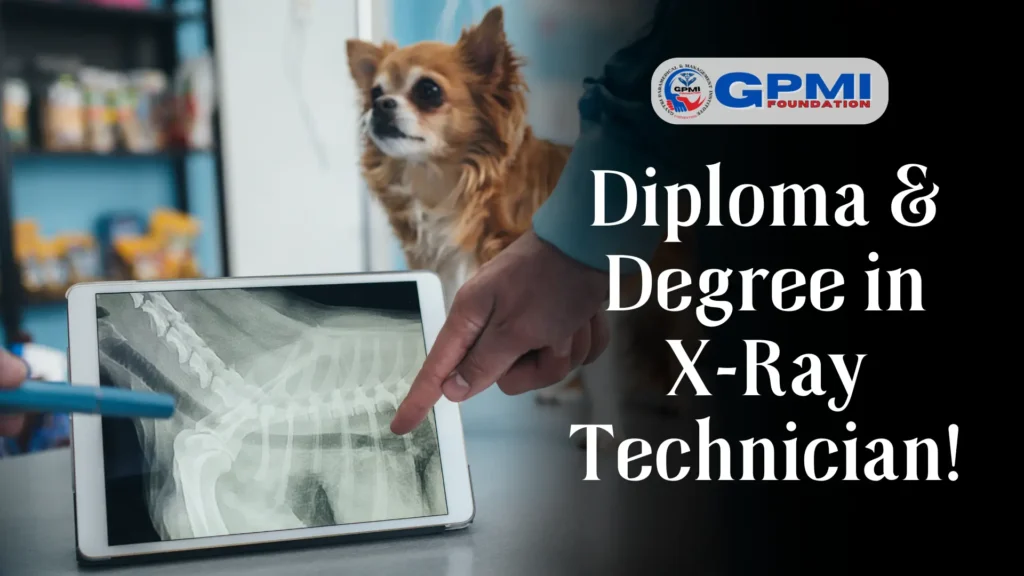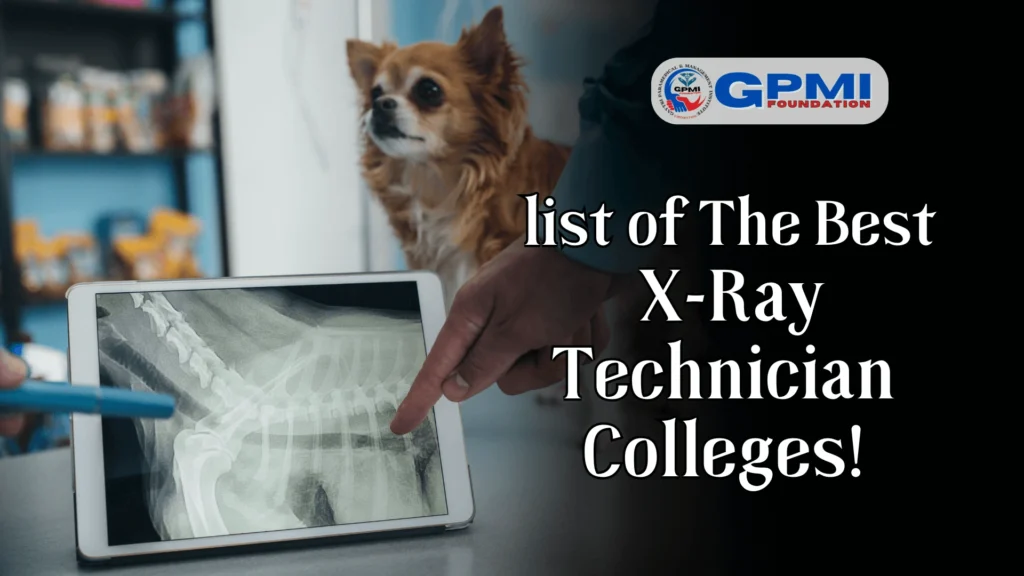Becoming an expert X-ray technician is a promising career path in the healthcare sector, offering stability and growth. As medical imaging plays a crucial role in diagnosing and treating diseases, skilled professionals are in high demand.
A structured approach can help you build the right expertise if you’re interested in this field. Choosing the right course to gain hands-on training and certification is essential for a successful career.
Today, we’ll explore seven easy steps to help you become a proficient X-ray technician and establish yourself in this rewarding profession. But before going forward let’s dive into the in-depth details of the X-ray technician course.
Table of Contents
What is X-ray Technician?
An X-ray Technician is a healthcare professional trained to operate X-ray machines and other imaging equipment to capture internal images of a patient’s body. These images help doctors diagnose fractures, infections, tumors, and other medical conditions.
X-ray technicians work in hospitals, diagnostic centers, and clinics, ensuring patient safety by following radiation protection protocols. Their responsibilities include positioning patients correctly, adjusting imaging settings, and maintaining equipment.
This career requires technical knowledge, attention to detail, and hands-on training in radiology. With growing demand in the medical field, X-ray technicians play a crucial role in modern healthcare diagnostics.
What is X-Ray Technician Course?
An X-ray technician Course is a specialized training program that prepares students to operate X-ray machines and perform medical imaging procedures.

The course covers anatomy, radiation safety, imaging techniques, and patient care. It is available as a certificate (6 months – 1 year), diploma (1-2 years), or degree (3 years) program. Students learn to take clear and accurate X-ray images to help doctors diagnose medical conditions.
After completing the course, graduates can work in hospitals, diagnostic centers, and clinics as X-ray technicians, radiology assistants, or imaging specialists. This course offers good job opportunities in the growing healthcare industry.
X-Ray Technician Course Details
| Course Particulars | Details |
|---|---|
| Course Duration & Types | Certificate: 6 months – 1 year – Diploma: 1 – 2 years – B.Sc./B.Voc.: 3 years |
| Eligibility | 10+2 with Science (Physics, Chemistry, Biology) – Some certificate courses accept 10th pass students |
| Subjects Covered | Human Anatomy & Physiology – Radiation Physics & Safety – X-ray Imaging Techniques – Patient Care & Positioning – Equipment Handling |
| Career Opportunities/ Job Roles | X-Ray Technician – Radiology Assistant – CT/MRI Technician – Diagnostic Center Staff |
| Average X-Ray Technician Salary | INR 1 Lac to INR 5 Lacs. |
| Job Sectors | Hospitals – Diagnostic Centers – Private Clinics – Research Labs |
Different Types of X-Ray Technician Course
| Course Type | Duration | Eligibility | Description |
|---|---|---|---|
| Certificate Course in X-Ray Technology | 6 months – 1 year | 10th or 12th pass | Basic training in X-ray imaging, equipment handling, and radiation safety. Suitable for entry-level jobs. |
| Diploma in X-Ray Technology | 1 – 2 years | 10+2 (Science) | Covers detailed imaging techniques, radiation safety, and patient care. Offers better job opportunities. |
| B.Voc. in Radiology & Imaging Technology | 3 years | 10+2 (Science) | Advanced training in radiology, imaging technology, and diagnostic procedures. Includes practical exposure. |
| B.Sc. in Radiology & Imaging Technology | 3 – 4 years | 10+2 (Science) | In-depth study of medical imaging, CT, MRI, and ultrasound technologies with hospital training. |
| PG Diploma in Radiology Technology | 1 – 2 years | Graduation in Science | Specialized training for advanced imaging techniques, ideal for career growth in radiology. |
These courses prepare students for careers in hospitals, diagnostic centers, and research labs.
X-Ray Technician Course Eligibility Criteria
| Course Type | Eligibility Criteria |
|---|---|
| Certificate Course | 10th or 12th pass from a recognized board |
| Diploma in X Ray Technology | 10+2 with Science (Physics, Chemistry, Biology) |
| B.Voc. in Radiology & Imaging Technology | 10+2 with Science (PCB/PCM) from a recognized board |
| B.Sc. in Radiology & Imaging Technology | 10+2 with Science (PCB/PCM) with at least 50% marks (varies by institute) |
| PG Diploma in Radiology Technology | Bachelor’s degree in Science (Biology, Physics, or related field) |
Some institutes may have entrance exams, while others offer direct admission. Also for Vocational Courses Arts & Commerce Students may Apply.
X-Ray Technician Course Fees
The fee structure for X-Ray Technician courses in India varies based on the type of program and the institution offering it. Below is an overview:
| Course Type | Duration | Approximate Fees |
|---|---|---|
| Certificate Course in X-Ray Technology | 6 months – 1 year | INR 10,000 – INR 25,000 |
| Diploma in X-Ray Technology | 1 – 2 years | INR 70,000 – INR 90,000 |
| Bachelor’s Degree (B.Sc. in Radiology & Imaging Technology) | 3 – 4 years | INR 1,00,000 – INR 10,00,000 |
Please note that these figures are approximate and can vary based on the institution, location, and facilities provided. It’s advisable to check with specific colleges or universities for the most accurate and up-to-date fee structures.
X-Ray Technician Salary & perk
The salary of an X-ray Technician in India varies based on factors such as experience, location, and the employing organization. Here’s an overview:
Average Salary
| Source | Average Monthly Salary | Average Annual Salary |
|---|---|---|
| Entry-level technicians | ₹12000 | ₹90,000 to ₹1,50,000. |
| With 1-2 years of experience | ₹18,000 | ₹1,60,000 to ₹2,60,000 |
| Experienced technicians | ₹35,000 | ₹2,00,000 to ₹6,00,000 |
Salaries can differ significantly based on location. For instance, X-ray Technicians in Kochi, Kerala, earn an average of ₹19,283 per month, there is an X-ray Technician Vacancy available while those in Mumbai, Maharashtra, average ₹15,585 per month.
Perks and Benefits:
- Health Insurance: Many employers offer medical coverage for technicians and their families.
- Paid Leave: Annual leave, sick leave, and maternity/paternity leave are commonly provided.
- Professional Development: Opportunities for further training and specialization, which can lead to higher earnings.
- Retirement Benefits: Provident funds and pension schemes are often part of the compensation package.
Specializations within radiology, such as CT Scan Technicians, may command higher salaries, ranging from ₹2.5 to ₹3.0 Lakhs annually. Please note that these figures are approximate and can vary based on individual qualifications, experience, and the specific employer.
X-Ray Technician Jobs & Responsibilities
X-ray technicians play a crucial role in healthcare by assisting doctors in diagnosing medical conditions using imaging technology. Their primary duties include:
Key Responsibilities:
- Operating X-ray machines: Positioning patients and adjusting imaging equipment to capture high-quality X-ray images.
- Patient Preparation: Explaining procedures, ensuring patient safety, and positioning them correctly for imaging.
- Radiation Safety Compliance: Following safety protocols to minimize radiation exposure to patients and healthcare staff.
- Image Processing & Analysis: Developing and reviewing X-ray films or digital images for clarity and accuracy.
- Equipment Maintenance: Ensuring X-ray machines and related equipment are clean and functioning properly.
- Record Keeping: Maintaining patient records, imaging reports, and documentation for future reference.
- Collaboration with Doctors: Assisting radiologists and physicians in diagnosing medical conditions using X-ray imaging.
- Emergency Support: Providing quick imaging services in critical care situations like accidents and trauma cases.
X-Ray Technicians are in demand across hospitals, diagnostic centers, clinics, and research institutions.

Diploma in X-Ray Technician Course
The Diploma in X-Ray Technician course is a specialized training program designed to equip students with the skills required to operate X-ray machines, conduct radiographic imaging, and assist radiologists in diagnosing medical conditions.
The course covers topics such as human anatomy, radiation physics, patient positioning, safety protocols, and imaging techniques. With a mix of theoretical knowledge and practical training, students gain expertise in handling modern radiology equipment used in hospitals and diagnostic centers.
Course Duration:- 1 to 2 years, Eligibility:- 12th pass
Course Benefits
- Quick Career Entry: A diploma allows students to start working in the medical field within 1-2 years.
- High Demand: X-ray technicians are essential in hospitals, clinics, and diagnostic labs.
- Job Security: The healthcare industry constantly requires skilled radiology professionals.
- Multiple Career Paths: Graduates can work as X-ray technicians, CT scan assistants, or radiology technicians.
- Affordable Education: Compared to degree programs, the diploma is a cost-effective way to enter the medical field.
Course Features
- Comprehensive Curriculum: Covers anatomy, physiology, radiographic techniques, and patient care.
- Hands-On Training: Practical exposure to X-ray machines and diagnostic imaging procedures.
- Experienced Faculty: Learn from professionals with expertise in radiology.
- Internship Opportunities: Gain real-world experience in hospitals and diagnostic centers.
- Industry-Relevant Skills: Training on modern imaging technology and radiation safety protocols.
- Flexible Learning: Available in full-time, part-time, or online modes in some institutions.
This course is an excellent choice for students who want a stable and rewarding career in the healthcare sector with minimal investment of time and money.
Degree in X-ray Technician Course
The Degree in X-Ray Technician course is an advanced undergraduate program that provides in-depth knowledge of radiology, medical imaging techniques, and patient care.
This course focuses on developing expertise in operating X-ray machines, CT scans, MRI, and other diagnostic imaging technologies. Students learn about radiation physics, human anatomy, pathology, and imaging protocols while gaining hands-on training in hospitals and diagnostic centers.
A degree in this field enhances career prospects, opening doors to senior-level roles in radiology departments.
Course Duration:- 3 years, Eligibility:- 12th pass
Course Benefits
- Higher Career Growth: A degree qualification offers better job opportunities and higher salaries than a diploma.
- Expand Job Roles: Graduates can work in advanced radiology fields, including MRI, CT scanning, and fluoroscopy.
- Global Recognition: A degree in radiology is recognized internationally, allowing job opportunities abroad.
- Stable and Secure Career: The demand for trained radiology professionals is growing in hospitals and diagnostic labs.
- Further Study Opportunities: Graduates can pursue master’s programs in radiology or specialized imaging fields.
Course Features
- Comprehensive Curriculum: Covers radiographic physics, imaging techniques, pathology, and patient care.
- Advanced Technology Training: Hands-on experience with modern X-ray, MRI, and CT scan machines.
- Internship & Practical Exposure: Real-world experience in hospitals, diagnostic centers, and research labs.
- Highly Experienced Faculty: Learning from expert radiologists and imaging specialists.
- Wide Career Scope: Employment in hospitals, private clinics, research institutes, and government healthcare facilities.
- Better Salary Packages: Graduates earn competitive salaries with opportunities for career advancement.
This course is ideal for students aiming for long-term career stability and higher positions in medical imaging and radiology.
X-Ray Technician Courses Admission & Career: 7 Steps

The admission process for X-Ray Technician Courses varies depending on the level of the program (Diploma, Degree, or Certificate). Below is a general 7-step-by-step guide:
Step 1: Choose the Right Course
- Diploma (1-2 years) – Quick entry into the field.
- Degree (3 years) – Better job opportunities and career growth.
- Certificate (6 months – 1 year) – Short-term training for basic skills.
Step 2: Check Eligibility Requirements & Institute
- Diploma & Certificate Courses: 10th or 12th pass (Science stream preferred).
- Degree Courses (B.Sc./B.Voc. in Radiology & Imaging Technology): 12th pass from a recognized university.
- Research institutions offering X-Ray Technician courses, ensuring they are recognized and affiliated such as universities, paramedical institutes (GPMI Foundation), or medical colleges.
Step 3: Fill Out the Application Form
- Fill out the application form online or offline, depending on the institution.
- Submit required documents like mark sheets, ID proof, and passport-size photographs.
Step 4: Selection Process
- Merit-Based Admission: Most institutes admit students based on their 10th or 12th marks.
- Entrance Exam (if applicable): Some universities conduct entrance tests for degree-level courses.
- Some institutes may conduct counseling sessions or personal interviews before finalizing admission.
- If selected, complete document submission and counseling sessions (if applicable).
Step 5: Pay Fees & Confirm Admission
- Pay the course fees and secure your admission, and now you are a student of the X-Ray Technician Course.
- Once admitted, you’ll begin your journey toward becoming a skilled X-ray technician with hands-on training and practical learning!
Step 6: Complete Internships & Get Certified
- Get hands-on experience by working in hospitals, diagnostic centers, or imaging labs.
- Learn patient positioning, safety protocols, and image interpretation.
- Some states or employers may require certifications in radiology or radiation safety.
- Government institutions or private organizations may offer specialized training programs.
Step 7: Apply for Jobs & Gain Experience
- Start your career in hospitals, clinics, diagnostic centers, or research labs.
- Gain experience and pursue higher certifications or specializations for career growth.
By following these steps, you can become an expert X-Ray Technician with in-depth knowledge and hands-on skills, leading to a successful and rewarding career!

X-ray Technician Course in Government College
Pursuing an X-Ray Technician Course at a government college in India offers quality education with affordable fees. Government colleges provide comprehensive training in X-Ray technology, focusing on:
- Radiographic Techniques: Learning to operate X-Ray machines and produce quality images.
- Radiation Safety: Understanding protocols to protect patients and technicians.
- Anatomy and Physiology: Gaining knowledge of the human body to assist in accurate imaging.
Eligibility Criteria
- Educational Qualification: Completion of 10+2 with Science subjects (Physics, Chemistry, Biology).
- Minimum Marks: Varies by institution; generally, a minimum aggregate score is required.
Admission Process
- Application: Submit applications through the respective college’s official website or admission portal.
- Entrance Exam: Some institutions may require candidates to appear for an entrance examination.
- Merit List: Selection is often based on academic performance and/or entrance exam scores.
- Counseling: Shortlisted candidates may need to attend counseling sessions for final seat allocation.
Notable Government Institutions Offering X-Ray Technician Courses
Pursuing an X-Ray Technician Course at a government college in India ensures quality education with affordable fees. Here are some notable government institutions offering such courses:
- All India Institute of Medical Sciences (AIIMS), New Delhi
Offers advanced training in radiology with state-of-the-art imaging technology. citeturn0search6 - Jawaharlal Institute of Postgraduate Medical Education and Research (JIPMER), Puducherry
Provides comprehensive radiology programs with modern facilities. - Postgraduate Institute of Medical Education and Research (PGIMER), Chandigarh
Offers specialized courses in radiodiagnosis and imaging. - King George’s Medical University (KGMU), Lucknow
Provides diploma courses in X-Ray technology with hands-on training. - Madras Medical College, Chennai
Offers diploma and degree programs in radiology and imaging technology. - Grant Medical College, Mumbai
Provides courses in radiography and medical imaging techniques. - Seth GS Medical College, Mumbai
Offers comprehensive programs in radiology and imaging sciences. - Maulana Azad Medical College (MAMC), New Delhi
Provides training in radiography and imaging technology. - Institute of Post Graduate Medical Education & Research (IPGMER), Chandigarh
Offers diploma courses in medical radiology technology. - Bangalore Medical College and Research Institute (BMCRI), Bengaluru
Provides programs in radiography and X-Ray technology.
For detailed information on eligibility criteria, admission processes, and course durations, it’s advisable to visit the official websites of these institutions or contact their admissions offices directly.
Top Private Colleges Offering X-ray Technician Courses in India
Pursuing an X-Ray Technician Course at a reputable private institution in India can provide quality education and promising career opportunities. Here are some top private colleges offering such courses:
- Dr. D.Y. Patil Medical College, Navi Mumbai
Offers a comprehensive radiology program that prepares students for careers in clinical practice, teaching, and research. - Acharya Institute of Health Sciences, Bangalore
Provides diploma courses in X-ray technology with hands-on training and modern facilities. - K.R. Mangalam University, Gurugram
Offers programs in radiology and imaging technology, focusing on practical skills and industry exposure. - Sri Ramachandra Institute of Higher Education and Research, Chennai
Provides programs in radiography and medical imaging techniques. - St. John’s Medical College, Bangalore
Offers comprehensive programs in radiology and imaging sciences. - Era University, Lucknow
Offers a Diploma in X-ray technician program designed to train students in the safe and effective operation of medical imaging equipment. erauniversity.in - Santosh Institute of Allied Health Sciences, Ghaziabad
Provides a Diploma in X-ray technician program focusing on practical skills and radiation safety. santosh.edu.in - Teerthanker Mahaveer University, Moradabad
Offers diploma and degree programs in radiology and imaging technology. - Dev Bhoomi Uttarakhand University, Dehradun
Provides courses in radiography and medical imaging techniques. - RajaRajeshwari College Of Nursing, Bangalore
Offers comprehensive programs in radiology and imaging sciences.
For detailed information on eligibility criteria, admission processes, and course durations, it’s advisable to visit the official websites of these institutions or contact their admissions offices directly.
Conclusion
Becoming an X-ray technician is a promising career choice after 12th, with various diploma and degree programs available across India. From government institutions like AIIMS, JIPMER, and PGIMER to private colleges like Dr. D.Y. Patil Medical College and Sri Ramachandra Institute, students have multiple options for quality education and hands-on training.
The admission process varies, but most courses require a science background. Salaries for X-ray technicians depend on experience and the institution, with AIIMS offering competitive pay.
With increasing demand in healthcare, pursuing an X-ray technician course ensures stable job opportunities in hospitals, diagnostic centers, and research labs.
Frequently Asked Question
Lorem ipsum dolor sit amet, consectetur adipiscing elit, sed do eiusmod tempor incididunt ut labore et dolore magna aliqua.
What is x-ray?
X-rays are a form of electromagnetic radiation that can pass through objects, including the human body. They are commonly used in medical imaging to create images of bones, tissues, and organs. When X-rays pass through the body, dense structures like bones absorb more radiation and appear white on the image, while softer tissues allow more radiation to pass through, appearing in shades of gray. This technology is widely used for diagnosing fractures, infections, lung conditions, and other medical issues.
What are the four main properties of X-rays?
High Penetration Power – It can pass through most substances, with denser materials like bones absorbing more radiation.
No Electric Charge – X-rays are neutral and not influenced by electric or magnetic fields.
Short Wavelength, High Energy – They have very short wavelengths and high frequencies, allowing them to carry significant energy.
Ionization Ability – X-rays can ionize atoms, which helps in medical imaging but also requires careful handling due to potential radiation exposure risks.
What is the fee structure of X-ray technician?
The fee structure for X-ray technician courses in India varies based on the type of program and the institution offering it.
Certificate Courses: Short-term programs, typically ranging from 6 months to a year, with fees between INR 10,000 and INR 25,000.
Diploma Courses: Two-year programs with fees ranging from INR 20,000 to INR 45,000.
Bachelor’s Degree (B.Sc. in X-Ray Technology): Three to four-year programs with fees between INR 1,00,000 and INR 10,00,000.
What Is the full form of X-ray?
X-rays, or X-radiation, are a type of electromagnetic radiation discovered by Wilhelm Conrad Röntgen in 1895. He named this newly found radiation “X-radiation” due to its unknown nature.
What is the lowest salary for an X-ray tech?
The lowest salary for an X-ray Technician in India typically starts at ₹10,000 – ₹15,000 per month for freshers working in small diagnostic centers or hospitals. However, salaries may vary based on location, institution, and experience.
Why Lorem Ipsum is So Popular?
Radiology Technicians with 3 to 8 years of experience earn between ₹3.1 Lakhs to ₹7 Lakhs annually. Radiologic Technologists with less than 1 year to 5 years of experienced salary ranging from ₹3 Lakhs to ₹5.4 Lakhs per year







